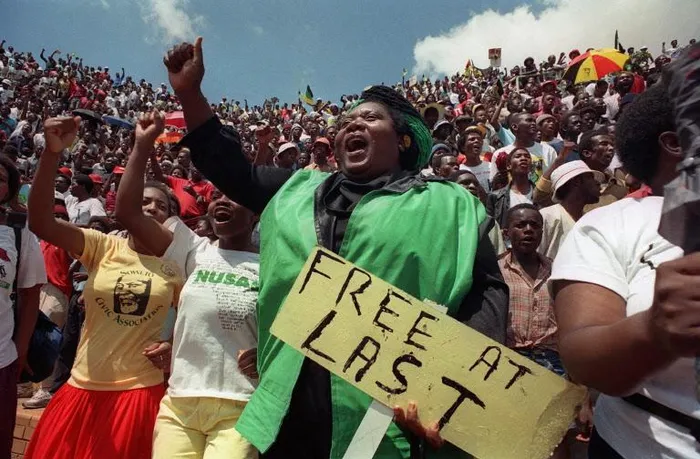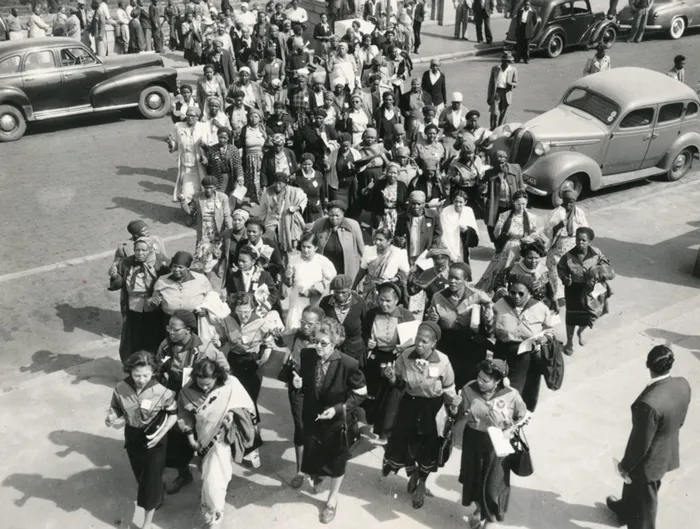Wathint’ Abafazi, Wathint’ Imbokodo: Reigniting the spirit of resistance
NATIONAL WOMEN'S DAY

Jubilant members of the ANC Women's League attend rally to welcome home Nelson Mandela at Orlando stadium in Soweto, February 12, 1990. It is no small indictment that, three decades into democracy, South Africa has yet to elect a woman president. It reflects a deeper resistance within the corridors of power to embrace gender equity fully, says the writer.
Image: AFP
Dr. Reneva Fourie
In 1956, women were at the forefront of confronting deep-rooted injustices. Today, their legacy is visible, yet women’s voices are increasingly diluted. The brave spirit that inspired nearly 20,000 women to march to the Union Buildings in Pretoria on 9 August of that year appears to be a distant memory.
The march remains one of the most courageous acts of resistance in South Africa’s history. It was not only a bold rejection of the extension of pass laws that criminalised Black men and sought to do the same to women. It was a direct challenge to the core of racial, gender and economic oppression.
Nearly seventy years later, much of that radical spirit has been softened. While National Women’s Day is widely commemorated, its original intent is often lost. Many of the spaces that once existed to elevate women have become watered down or tokenistic.
Representation in Parliament and the Cabinet is commendable, but it falls short in a system that remains patriarchal and often unaccountable. Having women in leadership is not sufficient if they are not supported to act with boldness and autonomy. A seat at the table is meaningless if the table itself is designed to exclude, silence and contain.
Too often, the very institutions that claim to support women are riddled with patriarchal dynamics. Women’s leadership is still questioned. Safety in political spaces remains uncertain. The voices of working-class and rural women are often overlooked in policy debates.
While not all women are silent, there is a clear and disturbing trend of suppression. Worse still is the way some women are pressured into silencing themselves. The progressive women’s movement, once a powerful force for mobilisation and justice, is increasingly relegated to symbolic gestures at formal events or used as voting fodder at party conferences. The pressure to remain aligned with party structures and internal factional interests often stifles independent anti-patriarchal thought.
It is no small indictment that, three decades into democracy, South Africa has yet to elect a woman president. This is not just a matter of symbolism. It reflects a deeper resistance within the corridors of power to embrace gender equity fully. Now, more than ever, we need to transform the table. We must reject a system where women are present but powerless.
Furthermore, National Women’s Day is increasingly framed as a day of appreciation rather than resistance. Commercial narratives celebrate women’s strength and resilience while downplaying questions about why so many women remain poor, unsafe and unheard. The urgency of gender struggles has been stripped away and replaced with platitudes.

National Women's Day is celebrated annually on August 9 to commemorate the 1956 march of 20,000 women to the Union Buildings in Pretoria to protest the apartheid regime's pass laws .
Image: Independent Media Archives
The Constitution promises equality, but that promise remains unfulfilled for too many. Many women, particularly Black, working-class and rural women, continue to face some of the harshest realities in the country. High levels of unemployment, persistent food insecurity, gender-based violence, limited access to land and housing, and failing public services define daily life for millions. Despite the promises of democracy, most women still struggle to access the opportunities they were supposed to have won in 1994.
This persistent inequality cannot be separated from the general economic policies implemented in post-apartheid South Africa. Neoliberal approaches that prioritise markets, privatisation and austerity have failed to deliver justice. While a small elite has benefited, most people, especially women, remain on the margins.
When state budgets are slashed and services are outsourced, it is often women who bear the brunt of the consequences. They are overrepresented in precarious and informal work and are expected to plug the gaps left by the state as unpaid caregivers and community safety workers. Their emotional labour is endless and unrecognised.
Yet amid these injustices, women across the world are rising. A growing global wave of feminist organising is reshaping what resistance looks like. Women are at the centre of movements for climate justice, economic fairness and democratic renewal. Across the African continent and throughout the Global South, women activists are linking gender justice with broader social struggles. Their work insists that justice must be holistic and rooted in economic transformation, accountability and a rejection of oppressive systems.
Even under brutal occupation in Gaza, Palestinian women continue to resist, organise and hold their communities together. Their resilience is not passive. It is defiant and active. Their example reminds us that gender struggles must be international, anti-colonial and courageous. Here in South Africa, young women are similarly rising. On campuses, in communities, both online and offline, they are crafting new forms of resistance to violence, inequality and exclusion.
But resistance needs more than spirit. It needs resources, platforms and institutional reform. Grassroots women’s groups, shelters, youth-led gender-conscious movements and labour organisations require sustained support. Government policies must be judged not by intention but by tangible outcomes in the lives of ordinary women. Civil society, academia, media and political organisations must all do more to dismantle the systems that perpetuate inequality, including challenging corruption.
Pretoria, where the 1956 march took place, is more than a geographic location. It is a symbol of state power and of the courage it takes to confront it. The participants in the march were not simply symbols of defiance. They were strategic, united and visionary. They came from across racial and class lines at a time when apartheid was bent on keeping people apart. Together, they embodied what collective power looks like when women organise around a clear political goal.
The slogan born from that march, Wathint’ Abafazi, Wathint’ Imbokodo – You strike a woman, you strike a rock – is not a slogan of endurance alone. It is a declaration of resistance. The rock is not passive. It pushes back.
National Women’s Day is not a day for hollow celebrations. It is a call to act. A call to organise. A call to support one another and speak out against the systems that continue to oppress and silence women. If we are to honour the women of 1956, we must reignite their fervour and carry forward their work with integrity, courage and urgency.
* Dr Reneva Fourie is a policy analyst specialising in governance, development and security.
** The views expressed do not necessarily reflect the views of IOL, Independent Media or The African.